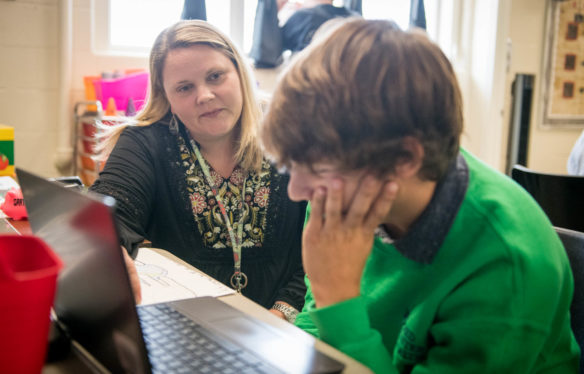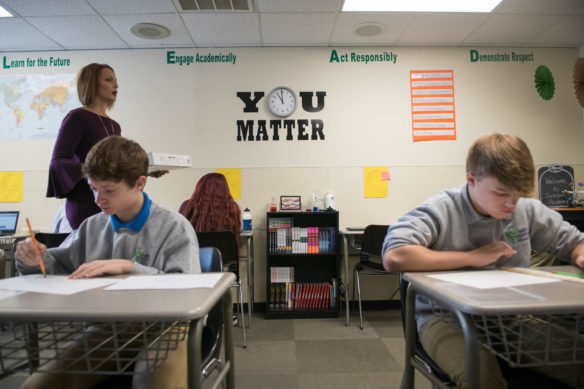
Melanie Wyatt, a teacher at Jackson Academy, works with 11th-grade student Tyler Thompson on an assignment. Jackson Academy is among 10 schools honored as 2018 Alternative Programs of Distinction by the Kentucky Department of Education.
Photo by Bobby Ellis, Aug. 27, 2018
By Mike Marsee
mike.marsee@education.ky.gov
Building relationships is always a critical part of ensuring students’ success, and that can be especially true in alternative programs.
That’s why creating a bond with their students is a priority for the staff at Jackson Academy, an alternative program in the Warren County schools.
“I tell all the students when they come that once they’re a Jackson student, they’re always mine,” said Eric Wilson, the principal at Jackson Academy.
Harvey Colwell, the director at Perry County Alternative School, said building relationships with students’ families can be just as important as having good relationships with the students themselves.
“What I try to tell parents is, ‘Let us have the opportunity to help your kids so they’ll have the opportunity to maintain at their home school,” Colwell said.
Perry County Alternative School and Jackson Academy are among 10 schools honored as Alternative Programs of Distinction by the Kentucky Department of Education.
Here’s a closer look at how the two schools make connections with students and parents:
Warren school works to change perception
At Jackson Academy, Wilson said it’s important to change the students’ perception of both themselves and their school.
“We are working diligently all the time just to show them how great they are,” he said. “We try to help them recognize the strengths that they’ve forgotten that they have. And we try to change their image of school.”
Students are asked to apply for jobs within the school, which come in the form of tasks that often play to their strengths.
“If they’re behind in their class work, we can show them things they’re good at with a classroom job,” coordinator Leslie Miller said. “And it’s neat to see them in a different setting.”
Miller said students have to complete their class work in order to get to do their job. She said some of the roles students enjoy include teacher’s assistant, cafeteria assistant, technology assistant, manager of the school’s Beacon Bills rewards program and even social media coordinator.

Joseph Dechant, left, and Dylan Burch work on assignments as coordinator Leslie Miller moves past them at Jackson Academy (Warren County). Jackson Academy uses social media as part of its effort to change the perception of the school, as daily tweets keep parents and the community informed of the good things taking place there.
Photo by Bobby Ellis, Aug. 27, 2018
Social media plays a key role in the efforts of the Jackson Academy staff to change the perception of their school. Daily tweets on the school’s Twitter feed keep parents and the entire community informed of what’s going on at the school, just as they do at other schools in the district.
“We had a district employee come in this week, and she said she saw a tweet about something two of our students had done,” Miller said. “She came in to personally congratulate those students. That would never have happened had we not had Twitter, and both of those young men were just on top of the world.
“The tweets are all positive so our district sees us differently, their home school sees them differently. We celebrate these kids every day.”
Jackson Academy serves about 70 to 80 students per year, and about 12 to 15 at any given time, with a coordinator, two teachers and three staff members.
Wilson said he was given the latitude to recruit and hire staff and faculty members rather than having them assigned to the school.
“It’s helpful that they want to be here, because they have a vested interested in the student,” he said. “Five years ago when I came here, that was one of the stipulations. When I took over, they wanted this program to be an intervention, not just a place where students come in and sit for 45 days.”
Wilson said there is “a dramatic increase” in most students’ math and reading scores from the time they arrive at Jackson Academy until they leave. He said that’s due in part to an attempt to maintain the connection between the student and his or her home school, and to follow up with students once they return to their home schools.
“I am in constant contact with their guidance counselors, letting them know how they’re doing,” he said.
Perry school invites parents to look inside
Open houses are commonplace at traditional schools, and they have a place at Perry County Alternative School as well.
“We allow parents to come in and see what we’re doing at their home school, and we want them to recognize that our students are doing what students at traditional schools are doing,” Colwell said. “When I’m meeting with parents, I tell them, ‘Before we make this decision, come down and visit.’ That has changed the mindset of how we’re perceived and what an alternative program is.”
Teachers and principals also are encouraged to visit the K-8 program. The program is located within West Perry Elementary School but serves elementary and middle school students from throughout the district, from just one or two at a time to a dozen or more.
Colwell said the two teachers and two staff members try to foster academic standards that are as close as possible to those of a traditional school.
“We try to do MAP screening like a traditional school, and we follow a standards-based curriculum so students can stay up on their work. We’re sending progress reports to the home school,” he said. “We’ve found that that has made it a lot easier for students. It’s not like they’re out of their classrooms for 30 days and then it’s a foreign language for them when they return.”
Colwell said the alternative program uses trauma-informed care – understanding, recognizing and responding to the effects of all types of trauma – with an eye toward both instruction and behavioral issues, as well as extensive follow-up once students return to their home schools.
Colwell, who is in his 10th year as director of the program, said he is very proud of where the program is heading.
“It’s amazing what has happened, especially in the last two years,” he said. “This recognition solidifies that we’re continuing to make improvements that are benefiting the students and the schools that they came from.
“And we’re not done; we still have things that were working on. We’re going to continue to find ways to make it better, continue to work to try improve the program to meet the needs of our students.”
MORE INFO …
Harvey Colwell Harvey.colwell@perry.kyschools.us
Leslie Miller leslie.miller@warren.kyschools.us
Eric Wilson eric.wilson@warren.kyschools.us




Leave A Comment